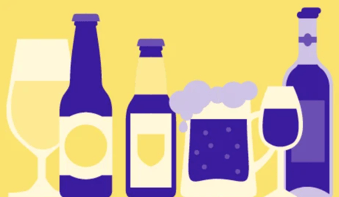 Alcohol consumption is a major risk factor for the development of colorectal cancer. The connection has been well-established, and the risk seems to be highest for heavy drinkers.
Alcohol consumption is a major risk factor for the development of colorectal cancer. The connection has been well-established, and the risk seems to be highest for heavy drinkers.
The alcohol found in alcoholic drinks is called ethanol. The breakdown of ethanol by your gastrointestinal tract can generate toxic substances like acetaldehyde. These substances can damage the DNA of cells in your colon and rectum. Damage to their DNA can cause the cells to replicate uncontrollably and form a tumor.
Ethanol may also cause changes to your gut’s microbiome that cause bowel inflammation and possibly activate enzymes that make you more prone to developing cancer.
In a large study from Taiwan, researchers analyzed the association between alcohol use disorder and colorectal cancer risk among 49,095 people who developed colorectal cancer. Alcohol use disorder is defined as:
- habitual alcohol consumption
- loss of control over alcohol intake
- negative emotional state when not using alcohol
The researchers found that people with alcohol use disorder had a 63.1% higher chance of developing colorectal cancer (95% CI between 56.5% and 69.9%) than people without alcohol use disorder.
The risk became higher with a longer duration of alcohol use disorder, reaching 167% (95% confidence intervals of 151.1–198.9%) after 11 years.
Heavy drinking and colorectal cancer
In a 2019 review of 16 studies, researchers collected information from 14,276 people with colorectal cancer and 15,802 people without colorectal cancer. They found supporting evidence that the link between alcohol consumption and colorectal cancer follows a J-curve, with higher amounts of alcohol causing rapidly higher rates of colorectal cancer.
They found:
- drinking up to two drinks per day was associated with an 8% lower risk of developing colorectal cancer compared with not drinking or occasional drinking
- drinking two to three drinks per day was not associated with a higher risk of colorectal cancer
- drinking more than three drinks per day was associated with a 25% higher risk of colorectal cancer
Drinking alcohol in an attempt to lower the risk of getting cancer is not recommended, as the negative effects of alcohol outweigh the potential benefits.
Alcohol consumption and early colorectal cancer risk
In a 2023 study, researchers investigated the link between daily alcohol consumption and the risk of early onset colorectal cancer using national health insurance data from more than 5.6 million people in South Korea between the ages of 20 and 49 years.
The researchers found that 8,314 people developed colorectal cancer during the 10-year study period. Light drinkers had a 9% (95% CI 2–16%) higher risk of developing colorectal cancer than non-drinkers. Heavy drinkers had a 20% higher chance (95% CI 11–29%).
Here's the takeaway: alcohol consumption is a well-established risk factor for the development of colorectal cancer. The risk seems to be highest if you drink heavily for many years.
Reducing your alcohol consumption may help lower your risk of developing colorectal cancer. However, it may take many years for your risk to drop to that of somebody who never drank heavily.

